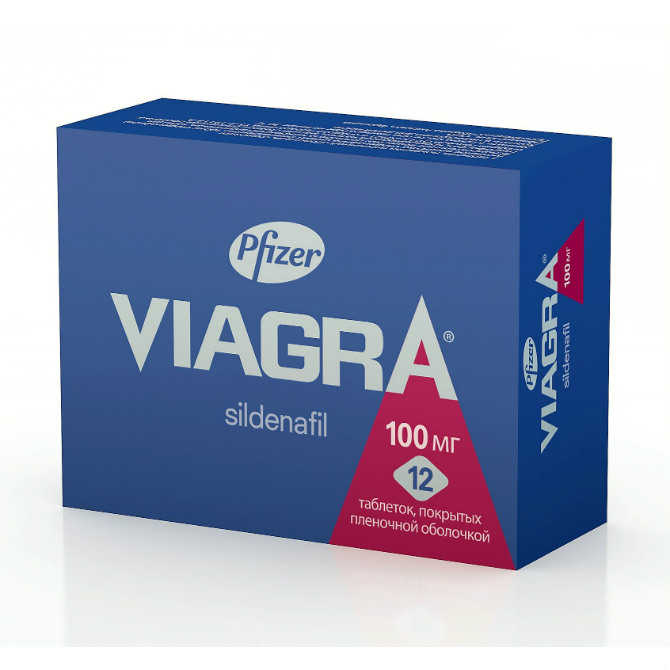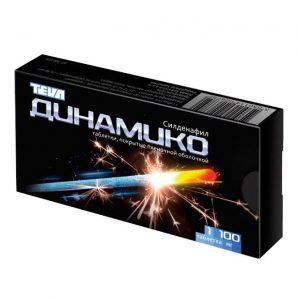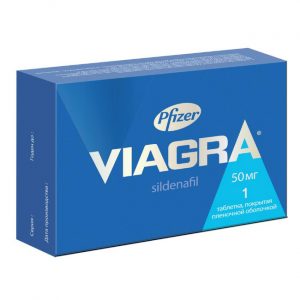Description
Release form
Tablets
Pharmacological action
Sildenafil is a potent selective inhibitor of cycloguanosine monophosphate (cGMP) type 5 phosphodiesterase (PDE-5).
Mechanism of Action
The physiological mechanism of erection is associated with the release of nitric oxide (NO) in the corpora cavernosa during sexual stimulation. This, in turn, leads to an increase in cGMP level, subsequent relaxation of the smooth muscle tissue of the corpora cavernosa and an increase in blood flow.
Sildenafil does not have a direct relaxing effect on an isolated human cavernous body, but enhances the effect of nitric oxide (NO) by inhibiting PDE-5, which is responsible for the breakdown of cGMP.
Sildenafil is selective against PDE-5 in vitro, its activity in relation to PDE-5 is superior to activity against other known phosphodiesterase isoenzymes: PDE-6 – 10 times PDE-1 – more than 80 times PDE-2, PDE-4, PDE-7 PDE-11 – more than 700 times. Sildenafil is 4,000 times more selective for PDE-5 compared to PDE-3, which is crucial because PDE-3 is one of the key enzymes in the regulation of myocardial contractility.
A prerequisite for the effectiveness of sildenafil is sexual stimulation.
Clinical Data
Cardiological since PDE-3 is one of the key enzymes in the regulation of myocardial contractility.
A prerequisite for the effectiveness of sildenafil is sexual stimulation.
Clinical Data
Cardiological since PDE-3 is one of the key enzymes in the regulation of myocardial contractility.
A prerequisite for the effectiveness of sildenafil is sexual stimulation.
Clinical Data
Cardiological
studies Use of sildenafil in doses up to 100 mg did not lead to clinically significant ECG changes in healthy volunteers. The maximum decrease in SBP in the supine position after taking sildenafil at a dose of 100 mg was 8.3 mm RT. Art. and dad – 5.3 mm RT. Art. A more pronounced, but also transient effect on blood pressure was observed in patients taking nitrates (see sections “Contraindications” and “Interaction”).
In a study of the hemodynamic effect of sildenafil in a single dose of 100 mg in 14 patients with severe coronary artery disease (more than 70% of patients had stenosis of at least one coronary artery), SBP and DBP at rest decreased by 7 and 6%, respectively, and pulmonary systolic pressure decreased by 9%. Sildenafil did not affect cardiac output and did not impair blood flow in stenosed coronary arteries, and also led to an increase (by about 13%) in the adenosin-induced coronary flow in both stenosed and intact coronary arteries.
In a double-blind, placebo-controlled study of 144 patients with erectile dysfunction and stable angina pectoris taking antianginal drugs (except nitrates) they performed physical exercises until the severity of symptoms of angina pectoris decreased. The duration of the exercises was significantly longer (19.9 s 0.9 38.9 s) in patients taking sildenafil in a single dose of 100 mg compared with patients receiving placebo.
In a randomized, double-blind, placebo-controlled study, the effect of changing the dose of sildenafil (up to 100 mg) in men (n = 568) with erectile dysfunction and hypertension was studied. taking more than two antihypertensive drugs. Sildenafil improved erection in 71% of men compared to 18% in the placebo group. The frequency of adverse effects was comparable to that in other groups of patients, as well as in individuals taking more than three antihypertensive drugs.
Studies of visual disturbances of
In some patients, 1 h after taking sildenafil at a dose of 100 mg using the Farnsworth-Munsel 100 test, a mild and transient impairment in the ability to distinguish shades of color (blue / green) was detected. 2 hours after taking the drug, these changes were absent. It is believed that color vision impairment is caused by the inhibition of PDE-6, which is involved in the process of light transmission in the retina. Sildenafil did not affect visual acuity, contrast perception, electroretinogram, intraocular pressure or pupil diameter.
In a placebo-controlled cross-sectional study of patients with proven early-stage macular degeneration (n = 9), a single dose of 100 mg sildenafil was well tolerated. There were no clinically significant changes in vision evaluated by special visual tests (visual acuity, Amsler lattice, color perception, color transmission modeling, Humphrey perimeter and photo stress).
Efficacy
The efficacy and safety of sildenafil was evaluated in 21 randomized, double-blind, placebo-controlled studies lasting up to 6 months in 3,000 patients aged 19 to 87 years with erectile dysfunction of various etiologies (organic, psychogenic or mixed). The effectiveness of the drug was evaluated globally using an erection diary, international index of erectile function (validated questionnaire on the status of sexual function) and a survey of a partner.
The effectiveness of sildenafil, defined as the ability to achieve and maintain an erection sufficient for satisfactory intercourse, was demonstrated in all studies and was confirmed in long-term studies lasting 1 year. In fixed-dose studies, the ratio of patients reporting that therapy improved their erection was 62% (sildenafil dose – 25 mg), 74% (sildenafil dose – 50 mg) and 82% (sildenafil dose – 100 mg) compared to 25% in the placebo group. The analysis of the international index of erectile function showed that in addition to improving erection, treatment with sildenafil also increased the quality of orgasm, allowed to achieve satisfaction from sexual intercourse and general satisfaction.
According to generalized data, among patients reporting improved erections during treatment with sildenafil were 59% of patients with diabetes, 43% of patients undergoing radical prostatectomy, and 83% of patients with spinal cord injuries (versus 16, 15 and 12% in the placebo group, respectively) .
Indications
Treatment of erectile dysfunction characterized by the inability to achieve or maintain an erection of the penis sufficient for satisfactory intercourse.
Sildenafil is effective only with sexual stimulation.
Contraindications
hypersensitivity to sildenafil or any other component of the
preparation use in patients receiving nitric oxide donors, organic nitrates or nitrites in any form continuously or intermittently, since sildenafil enhances the hypotensive effect of nitrates (see section “Interaction” combined use with other agents for the treatment of erectile dysfunction (the safety and effectiveness of Viagra ® have not been studied with combined use, see the section Specific and I”), therefore, the use of such combinations is not recommended
is not intended for use on a registered indication in children under 18
is not intended for use on a registered indication in women.
Use during pregnancy and lactation
According to the registered indication, the drug is not intended for use in women.
Special instructions
To diagnose erectile dysfunction, determine their possible causes and choose an adequate treatment, you need to collect a complete medical history and conduct a thorough physical examination.
Sexual activity poses a certain risk in the presence of heart disease, therefore, before starting any therapy for erectile dysfunction, the doctor should refer the patient to an examination of the condition of CVS. Sexual activity is undesirable in patients with heart failure, unstable angina pectoris, suffered a myocardial infarction or stroke in the last 6 months, life-threatening arrhythmias, arterial hypertension (BP> 170/100 mm Hg) or hypotension (BP mm Hg) (see section “Contraindications”, subsection “With caution”). In clinical studies, there was no difference in the incidence of myocardial infarction (1.1 per 100 people per year) or the mortality rate from cardiovascular diseases (0.3 per 100 people per year) in patients receiving Viagra ® compared to placebo patients.
Drugs intended for the treatment of erectile dysfunction should not be prescribed to men for whom sexual activity is undesirable.
Viagra ® has a systemic vasodilating effect, leading to a transient decrease in blood pressure, which is not a clinically significant phenomenon and does not lead to any consequences in most patients. Nonetheless, Before prescribing Viagra ®, the doctor must carefully assess the risk of possible undesirable manifestations of vasodilating effects in patients with relevant diseases, especially against the background of sexual activity. Increased susceptibility to vasodilators is observed in patients with left ventricular outflow tract obstruction (aortic stenosis, hypertrophic obstructive cardiomyopathy), as well as a rare syndrome of multiple systemic atrophy, which manifests itself as a severe violation of the regulation of blood pressure by the autonomic nervous system.
Rare cases of the development of anterior ischemic optic neuropathy of non-arterial origin have been noted as the causes of deterioration or loss of vision against the background of the use of all PDE-5 inhibitors, including sildenafil. Most of these patients had risk factors, such as excavation (deepening) of the optic head, over 50 years old, diabetes mellitus, hypertension, coronary heart disease, hyperlipidemia and smoking. No causal relationship between the intake of PDE-5 inhibitors and the development of anterior ischemic optic neuropathy of non-arterial origin was found. The doctor should inform the patient about the increased risk of developing anterior ischemic optic neuropathy of non-arterial origin, if this condition has already been noted in him. Since the combined use of sildenafil and β-blockers can lead to symptomatic hypotension in some sensitive patients, Viagra ® should be used with caution in patients taking β-blockers (see section Interaction ). To minimize the risk of developing postural hypotension in patients taking -Adrenergic blockers, Viagra ® should be started only after hemodynamic stabilization is achieved in these patients. It should also consider the feasibility of reducing the initial dose of Viagra ® (see section “Dosage and Administration”). The doctor should inform patients about what actions should be taken in case of symptoms of postural hypotension.
A small number of patients with hereditary retinitis pigmentosa have genetically determined dysfunctions of the retinal phosphodiesterases. There is no information on the safety of using Viagra ® in patients with retinitis pigmentosa, therefore, sildenafil should be used with caution (see the “Contraindications” section, the “Caution” subsection).
Sildenafil enhances the antiaggregation effect of sodium nitroprusside (nitric oxide donor) on human platelets in vitro. There is no information on the safety of the use of Viagra ® in patients with internal bleeding or active peptic ulcer of the stomach, therefore it should be used with caution (see section Contraindications , subsection Caution ).
Treatments for erectile dysfunction should be used with caution in patients with anatomical deformation of the penis (angulation, cavernous fibrosis, Peyronie’s disease), or in patients with risk factors for priapism (sickle cell anemia, multiple myeloma, leukemia) (see section “Contraindications” , subsection “With caution”).
The safety and effectiveness of Viagra ® in combination with other drugs for the treatment of erectile dysfunction has not been studied, so the use of such combinations is not recommended (see “Contraindications”).
In some post-marketing and clinical studies using all PDE-5 inhibitors, including sildenafil, a sudden decrease or loss of hearing was reported in patients. However, most of these patients had risk factors for the development of this pathology, and no correlation was found between the use of PDE-5 inhibitors and a sudden decrease or loss of hearing. In the event of a sudden decrease or loss of hearing, discontinue therapy with sildenafil and consult a doctor immediately.
Influence on the ability to drive a car or perform work, requiring increased speed of physical and mental reactions. Against the background of taking sildenafil, no negative effect on the ability to drive a car or other technical means was observed. However, since the intake of sildenafil may decrease blood pressure, the development of chromatopsy, blurred vision, etc. side effects, you should carefully consider the individual effect of the drug in these situations, especially at the beginning of treatment and when changing the dosage regimen.
Composition
1 tab.
sildenafil (in the form of citrate) 100 mg
Excipients:
microcrystalline cellulose,
calcium hydrogen phosphate,
croscarmellose sodium,
magnesium stearate.
Film composition:
Opadry blue OY-LS-20921 (hypromellose, lactose, triacetin, titanium dioxide (E171), aluminum varnish based on indigo carmine (E132)) and Opadry transparent YS-2-19114-A (hypromellose, triacetin).
Dosage and administration of
Inside, approximately 1 hour before sexual activity.
The recommended dose for most adult patients is 50 mg. Given the effectiveness and tolerability, the dose can be increased to 100 mg or reduced to 25 mg. The maximum recommended dose is 100 mg. The maximum recommended frequency of use is 1 time per day.
Impaired renal function. With mild to moderate degree of renal failure (Cl creatinine 3080 ml / min) dose adjustment is not required, with severe renal failure (Clcreatinin
Impaired liver function. Since the excretion of sildenafil is impaired in patients with liver damage (in particular with cirrhosis), the dose of Viagra® should be reduced to 25 mg.
Joint use with other drugs
When combined with ritonavir, the maximum single dose of Viagra® should not exceed 25 mg, and the frequency of use – once every 48 hours (see section “Interaction”).
When used together with CYP3A4 cytochrome isoenzyme inhibitors (erythromycin, saquinavir, ketoconazole, itraconazole), the initial dose of Viagra® should be 25 mg (see Interaction section).
To minimize the risk of postural hypotension in patients taking? -blockers, Viagra® should only be started after hemodynamic stabilization is achieved in these patients. The feasibility of lowering the initial dose of sildenafil should also be considered (see sections “Special Instructions” and “Interaction”).
Elderly patients. No dose adjustment for Viagra is required.
Side effects
General disorders: hypersensitivity reactions (including skin rash).
Changes in the central nervous system and peripheral nervous system: convulsions.
Changes in CCC: tachycardia, decreased blood pressure, fainting, nosebleeds.
Gastrointestinal Disorders: Vomiting.
Changes in the organ of vision: eye pain, redness of the eyes / injection of sclera.
Reproductive system disorders: prolonged erection and / or priapism.
Drug interactions
The effect of other drugs on the pharmacokinetics of sildenafil
Sildenafil metabolism occurs mainly under the influence of cytochrome CYP3A4 isoenzymes (the main pathway) and CYP2C9, so inhibitors of these isoenzymes can decrease the clearance of sildendenyl sildenylfen and sildendenil. A decrease in the clearance of sildenafil was noted with the simultaneous use of inhibitors of the cytochrome CYP3A4 isoenzyme (ketoconazole, erythromycin, cimetidine). Cimetidine (800 mg), a non-specific inhibitor of the cytochrome CYP3A4 isoenzyme, when taken together with sildenafil (50 mg) causes an increase in plasma concentration of sildenafil by 56%. A single dose of 100 mg of sildenafil together with erythromycin (500 mg / day 2 times a day for 5 days), a specific inhibitor of the cytochrome CYP3A4 isoenzyme, against the background of achieving a constant concentration of erythromycin in the blood, leads to an increase in AUC of sildenafil by 182%. With the combined use of sildenafil (once 100 mg) and saquinavir (1200 mg / day in 3 doses), an HIV protease inhibitor and the cytochrome isoenzyme CYP3A4, against the background of achieving a constant concentration of saquinavir in the blood, Cmax sildenafil increased by 140%, and AUC increased by 210%. Sildenafil has no effect on the pharmacokinetics of saquinavir. Stronger inhibitors of the cytochrome CYP3A4 isoenzyme, such as ketoconazole and itraconazole, can also cause stronger changes in the pharmacokinetics of sildenafil.
The simultaneous use of sildenafil (once 100 mg) and ritonavir (500 mg 2 times a day), an HIV protease inhibitor and a strong cytochrome P450 inhibitor, against the background of achieving a constant concentration of ritonavir in the blood, leads to an increase in Cmaxsildenafil by 300% (4 times ), and AUC – by 1000% (11 times). After 24 hours, the concentration of sildenafil in the blood plasma is about 200 ng / ml (after a single use of one sildenafil – 5 ng / ml).
If sildenafil is taken in recommended doses, patients receiving simultaneously potent inhibitors of the cytochrome CYP3A4 isoenzyme, then the Cmax of free sildenafil does not exceed 200 nM, and the drug is well tolerated.
A single dose of antacid (magnesium hydroxide / aluminum hydroxide) does not affect the bioavailability of sildenafil.
CYP2C9 cytochrome isoenzyme inhibitors (tolbutamide, warfarin), CYP2D6 cytochrome isoenzyme inhibitors (SSRIs, tricyclic antidepressants), thiazide and thiazide-like diuretics, ACE inhibitors and calcium antagonists do not affect pharmacokin pharmacokin.
Azithromycin (500 mg / day for 3 days) has no effect on AUC, Cmax, Tmax, excretion rate constant, and T1 / 2 of sildenafil or its main circulating metabolite.
Effect of sildenafil on other drugs
Sildenafil is a weak inhibitor of cytochrome P450 isoenzymes – 1A2, 2C9, 2C19, 2D6, 2E1 and 3A4 (IC50> 150 μmol). When taking sildenafil in recommended doses, its Cmax is about 1 μmol, so it is unlikely that sildenafil can affect the clearance of substrates of these isoenzymes.
Sildenafil enhances the hypotensive effect of nitrates both with prolonged use of the latter, and with their appointment for acute indications. In this regard, the use of sildenafil in combination with nitrates or nitric oxide donors is contraindicated.
With the simultaneous administration of? -adrenoblocker doxazosin (4 or 8 mg) and sildenafil (25, 50 or 100 mg) in patients with benign prostatic hyperplasia with stable hemodynamics, the average additional decrease in sAD / dAD in the supine position was 7/7, 9 / 5 and 8/4 mm RT. Art. respectively, and in a standing position – 6/6, 11/4 and 4/5 mm RT. Art. respectively.
Rare cases of the development of symptomatic postural hypotension in such patients, manifested in the form of dizziness (without fainting), have been reported. In some sensitive patients receiving? -Adrenergic blockers, the simultaneous use of sildenafil can lead to symptomatic hypotension.
There was no evidence of significant interaction with tolbutamide (250 mg) or warfarin (40 mg), which are metabolized by the cytochrome CYP2C9 isoenzyme.
Sildenafil (100 mg) has no effect on the pharmacokinetics of HIV protease inhibitors, saquinavir and ritonavir, which are substrates of the cytochrome CYP3A4 isoenzyme, at their constant blood level.
Sildenafil (50 mg) does not cause an additional increase in bleeding time when taking acetylsalicylic acid (150 mg).
Sildenafil (50 mg) does not enhance the hypotensive effect of alcohol in healthy volunteers with an average blood alcohol Cmax of 0.08% (80 mg / dl).
In patients with arterial hypertension, no signs of interaction of sildenafil (100 mg) with amlodipine were detected. The average additional decrease in blood pressure in the supine position is 8 mm RT. Art. (CAD) and 7 mm RT. Art. (dad).
The use of sildenafil in combination with antihypertensive agents does not lead to additional side effects.
Overdose
Symptoms: with a single dose of Viagra ® at a dose of up to 800 mg, adverse events were comparable to those when taking the drug in lower doses, but were more common.
Treatment: symptomatic. Hemodialysis does not accelerate clearance of sildenafil, as the latter actively binds to plasma proteins and is not excreted by the kidneys.
Storage Conditions
In a dry place, at a temperature not exceeding 30 ° C.
Keep out of the reach and sight of children.
Term hodnosty
5 years
active substance
Sildenafil
Terms leave through pharmacies
Prescription




